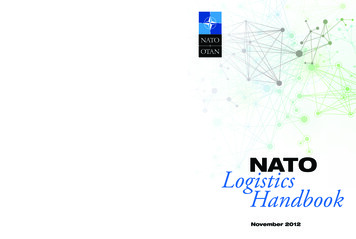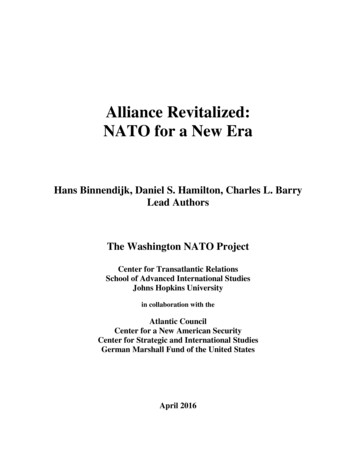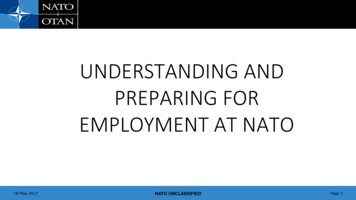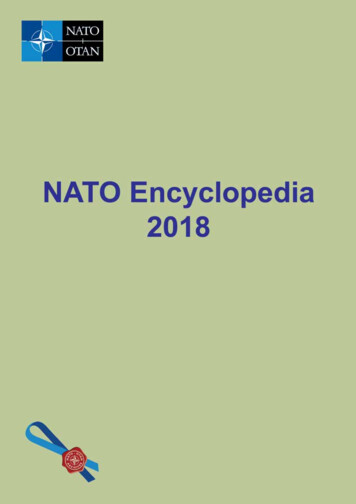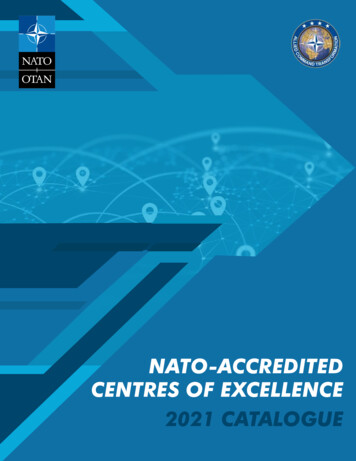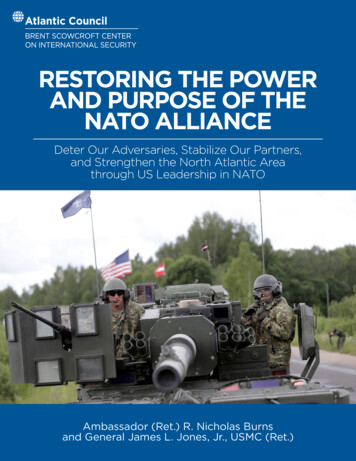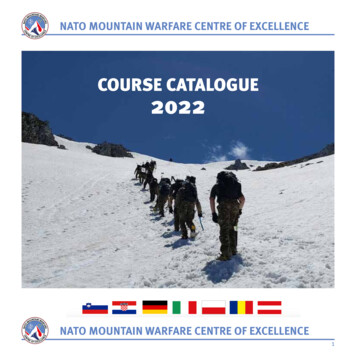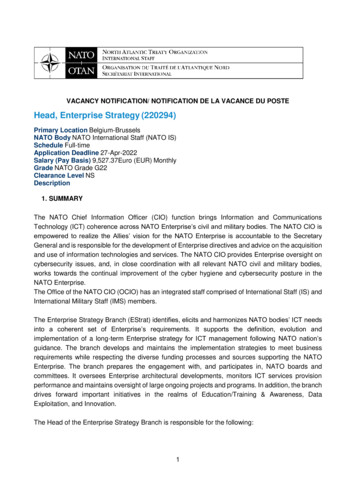
Transcription
VACANCY NOTIFICATION/ NOTIFICATION DE LA VACANCE DU POSTEHead, Enterprise Strategy (220294)Primary Location Belgium-BrusselsNATO Body NATO International Staff (NATO IS)Schedule Full-timeApplication Deadline 27-Apr-2022Salary (Pay Basis) 9,527.37Euro (EUR) MonthlyGrade NATO Grade G22Clearance Level NSDescription1. SUMMARYThe NATO Chief Information Officer (CIO) function brings Information and CommunicationsTechnology (ICT) coherence across NATO Enterprise’s civil and military bodies. The NATO CIO isempowered to realize the Allies’ vision for the NATO Enterprise is accountable to the SecretaryGeneral and is responsible for the development of Enterprise directives and advice on the acquisitionand use of information technologies and services. The NATO CIO provides Enterprise oversight oncybersecurity issues, and, in close coordination with all relevant NATO civil and military bodies,works towards the continual improvement of the cyber hygiene and cybersecurity posture in theNATO Enterprise.The Office of the NATO CIO (OCIO) has an integrated staff comprised of International Staff (IS) andInternational Military Staff (IMS) members.The Enterprise Strategy Branch (EStrat) identifies, elicits and harmonizes NATO bodies’ ICT needsinto a coherent set of Enterprise’s requirements. It supports the definition, evolution andimplementation of a long-term Enterprise strategy for ICT management following NATO nation’sguidance. The branch develops and maintains the implementation strategies to meet businessrequirements while respecting the diverse funding processes and sources supporting the NATOEnterprise. The branch prepares the engagement with, and participates in, NATO boards andcommittees. It oversees Enterprise architectural developments, monitors ICT services provisionperformance and maintains oversight of large ongoing projects and programs. In addition, the branchdrives forward important initiatives in the realms of Education/Training & Awareness, DataExploitation, and Innovation.The Head of the Enterprise Strategy Branch is responsible for the following:1
supporting the NATO CIO with the establishment of an operating model to enable thecoherence and harmonisation of capabilities and services provided across the NATOEnterprise;supporting the NATO CIO in directing and assisting with compliance to NATO EnterpriseCommunications and Information Vision and associated policy, directives, guidance andstandards; andleading, planning, and supervising the work of subordinates in a newly formed team.The successful candidate will be part of developing and shaping a new function for NATO. Keychallenges and deliverables include:#1 Establishing the CIO function’s strategic oversight role. The Head of EStrat will need to workcollaboratively across the NATO Enterprise to support the NATO Chief Information Officer inplanning and implementing the new function, which will be a significant change programme for theorganisation. S/he will need to identify and develop the right relationships and business processesto have effective oversight of Enterprise-wide ICT needs, services and capabilities for the first timeto improve consistency and coherence across separate NATO civil and military bodies.#2 Delivering strategy through action. The Head of EStrat will pioneer and lead an approach todeveloping coherent, strategic-level architecture for Enterprise capabilities and services to supportand enable an agile and connected Alliance. S/he will need to influence and interact with keycounterparts to better standardize the approach to architecture across the NATO bodies.Candidates are expected to attach to their application a point paper, of maximum two A4 pages,summarising their views about these and other possible challenges, and how they would addressthem if selected for the position.2.QUALIFICATIONS AND EXPERIENCEESSENTIALThe incumbent must: hold a university degree or an equivalent level of qualification in a relevant field (e. g.technology/computer science, business, etc.) from an institute of recognised standing; have at least 10 years of relevant professional experience in portfolio/cloud, security, dataarchitecture/service or/and performance management in large industry-leading companiesor governmental organisations; have at least 5 years of senior management experience leading international multidisciplinary teams, extensive experience in managing enterprise-wide programmes, influencing senior-levelmanagement and key stakeholders in a complex environment; have solidly demonstrated experience in ICT strategic management; have demonstrated capability in contributing to ICT transformational initiatives in complexand dynamic environments; have the capacity for independent conceptual analysis and intellectual leadership on issuesaffecting ICT capabilities, services and cybersecurity; be able to draft high-level policy documents and background briefs clearly and concisely,prepare and deliver convincing presentations;2
strong passion for information technology with a strong commitment to maintain andimprove oversight on technology evolution;possess the following minimum levels of NATO’s official languages (English/French): V(“Advanced”) in one; I (“Beginner”) in the other.DESIRABLEThe following would be considered an advantage: a Master degree in a relevant field from an institute of recognised standing; market leading technology certifications such as COBIT, ISO, PRINCE2, PMP, MSP, ITIL; be familiar with the NATO civilian and military structure and be conversant with thechallenges, tasks and new missions of the Alliance in the changing strategic and politicomilitary environment; knowledge of NATO responsibilities and organisations, in particular Allied Commandtransformation (ACT) and Allied Command Operations (ACO); experience in multinational programmes and cooperative developments; experience with international and/or organisations and a good knowledge of their methodsof work and practices; deep understanding of current and emerging technologies and how enterprises areemploying them to drive digital transformation forward.3.MAIN ACCOUNTABILITIESPeople ManagementSupport the Office in cultivating a motivating, inclusive and effective workplace. Lead, plan, directand supervise the work of the unit’s personnel. Provide mentoring, coaching and trainingopportunities and be available to offer guidance at critical moments. Ensure that all staff under theirresponsibility have clarity about organizational, divisional, office and branch objectives. Provideregular, fair and objective feedback on performance, informally as appropriate, and via the HQPerformance Review and Development (PRD) system. Ensure the development of staff throughsound and inclusive management principles. Create a motivating and effective workplace. Championdiversity and inclusion. Participate in recruitment procedures for vacant posts organisation-wide inaccordance with NATO recruitment guidelines.Vision and DirectionThe Head of Enterprise Strategy assists the NATO CIO in developing and formulating strategic goalsand objectives for the OCIO in concert with NATO’s goals and objectives. Propose goals, formulateobjectives for the branch, harmonised with the OCIO mission, objectives and goals, and ensurefollow-up and implementation.Project ManagementEnsure that project/programme deliverables of the branch are attainable and guide their progress.Identify risks and undertake contingency planning.Policy DevelopmentContribute to the development of policy, directive and guidance documents in the areas ofresponsibility of the OCIO. In particular, support the NATO CIO to act as the Enterprise Customerthrough harmonising Enterprise-wide requirements, investments, operations and maintenance,3
baseline configuration control, and change processes. Provide strategic advice regarding ICTinvestments across the NATO Enterprise.Expertise DevelopmentSupport the NATO CIO to direct and assist with compliance to NATO Enterprise Communicationsand Information Vision and its associated policy, directives, guidance and standards. Develop andmaintain metrics and report progress of implementation and operation of capabilities and serviceperformance against them. Coordinate the development and embed the Enterprise use ofarchitectures for Enterprise capabilities and services.Stakeholder ManagementEngage and coordinate with all relevant NATO Enterprise stakeholders, ensuring as broadcollaboration as possible in the development of policies, directives, guidance and standards. Closelycoordinate with NATO staff working on the lifecycle of Enterprise capabilities and services(requirements, investments, operations, maintenance and disposal). Engage with industry andacademia in the post’s domain of expertise as required. Develop close cooperation and workingrelationships with stakeholders, including the Consultation, Command and Control (C3) Board, theAgencies Supervisory Boards, the Cyber Defence Committee, the Military Committee, the ResourcePlanning and Policy Board, and other relevant senior policy committees and boards, in accordancewith the evolution of the OCIO responsibilities and available resources.Representation of the OrganizationRepresent and speak on behalf of the OCIO and the Enterprise Strategy Branch in committees,panels or working groups in industry and academia on matters pertaining to the post’s domain ofexpertise. Act as the focal point on those matters.Knowledge ManagementDraft background briefs, progress reports, prepare presentations, and other items for high-levelmeetings. Ensure that the design and implementation of knowledge management systems for theoffice ensures the collection and distribution of high-quality content.Organizational EfficienciesIdentify, plan and propose implementation of initiatives, aimed at improving efficiency andeffectiveness across all areas of C3 capabilities, services delivery and operations.Financial ManagementProvide inputs to the OCIO budget/Programme of Work (PoW) and maintain an overview of assignedbudgets in their execution and reporting.Perform any other related duty as assigned.4. INTERRELATIONSHIPSThe Head of Enterprise Strategy reports to the NATO Chief Information Officer who is also theDirector of the OCIO.4
S/he will work closely with other members of the OCIO and will interact on a regular basis with othermembers in the International Staff, International Military Staff, Strategic Commands, NATO Agenciesand other NATO Enterprise bodies.S/he will liaise with leadership in relevant international organisations, industry and academia, asrequired.Direct reports: 6Indirect reports: 125.COMPETENCIESThe incumbent must demonstrate: Achievement: Sets and works to meet challenging goals;Change Leadership: Personally leads change;Conceptual Thinking: Clarifies complex data or solutions;Developing Others: Provides in-depth mentoring, coaching and training;Impact and Influence: Uses indirect influence;Initiative: Plans and acts for the long-term;Leadership: Positions self as the leader;Organizational Awareness: Understands organisational politics;Self-Control: Stays composed and positive even under extreme pressure.6. CONTRACTContract to be offered to the successful applicant (if non-seconded): Definite durationcontract of three years; possibility of renewal for up to three years, during which the incumbentmay apply for conversion to an indefinite duration contract.Contract clause applicable: In accordance with the contract policy, this is a post in whichturnover is desirable for political reasons in order to be able to accommodate the Organisation'sneed to carry out its tasks as mandated by the Nations in a changing environment, for example bymaintaining the flexibility necessary to shape the Organisation's skills profile, and to ensureappropriate international diversity. The maximum period of service foreseen in this post is 6 years.The successful applicant will be offered a 3-year definite duration contract, which may be renewedfor a further period of up to 3 years. However, according to the procedure described in the contractpolicy the incumbent may apply for conversion to an indefinite contract during the period of renewaland no later than one year before the end of contract. If the successful applicant is seconded fromthe national administration of one of NATO’s member States, a 3- year definite duration contractwill be offered, which may be renewed for a further period of up to 3 years subject also to theagreement of the national authority concerned. The maximum period of service in the post as aseconded staff member is six years. Serving staff will be offered a contract in accordance with theNATO Civilian Personnel Regulations.7. RECRUITMENT PROCESSPlease note that we can only accept applications from nationals of NATO member countries.Applications must be submitted using e-recruitment system, as applicable:5
For NATO civilian staff members only: please apply via the internal recruitment portal(link);For all other applications: www.nato.int/recruitmentCandidates are requested to attach their essay to their application on Taleo, by latest the 27 ofApril, 23h59 (CET Brussels time).The title of the attachment must include the vacancy reference 220294 and the words “Keychallenges”Please note that at the time of the interviews, candidates will be asked to provide evidence of theireducation and professional experience as relevant for this vacancy.Appointment will be subject to receipt of a security clearance (provided by the national Authoritiesof the selected candidate) and approval of the candidate’s medical file by the NATO MedicalAdviser.More information about the recruitment process and conditions of employment, can be found at ourwebsite htm).8. ADDITIONAL INFORMATIONNATO is committed to diversity and inclusion, and strives to provide equal access to employment,advancement and retention, independent of gender, age, nationality, ethnic origin, religion or belief,cultural background, sexual orientation, and disability. NATO welcomes applications of nationalsfrom all member Nations, and strongly encourages women to apply.Building Integrity is a key element of NATO’s core tasks. As an employer, NATO valuescommitment to the principles of integrity, transparency and accountability in accordance withinternational norms and practices established for the defence and related security sector. Selectedcandidates are expected to be role models of integrity, and to promote good governance throughongoing efforts in their work.Due to the broad interest in NATO and the large number of potential candidates, telephone or email enquiries cannot be dealt with.Applicants who are not successful in this competition may be offered an appointment to anotherpost of a similar nature, albeit at the same or a lower grade, provided they meet the necessaryrequirements.The nature of this position may require the staff member at times to be called upon to travel forwork and/or to work outside normal office hours.The organization offers several work-life policies including Teleworking and Flexible Workingarrangements (Flexitime) subject to business requirements.Please note that the International Staff at NATO Headquarters in Brussels, Belgium is a nonsmoking environment.For information about the NATO Single Salary Scale (Grading, Allowances, etc.) please visitour website. Detailed data is available under the Salary and Benefits tab.6
Chef, Stratégie d’entreprise (220294)Emplacement principal Belgique-BruxellesOrganisation OTAN SIHoraire Temps pleinDate de retrait 27-avr.-2022Salaire (Base de paie) 9 527,37Euro (EUR) MensuelleGrade NATO Grade G22Niveau de l'habilitation de sécurité NSDescription1. RÉSUMÉLa fonction de directrice/directeur des systèmes d’information (CIO) de l’OTAN assure lacohérence des technologies de l’information et de la communication (TIC) au sein des organismescivils et militaires de l’entreprise OTAN. La/Le CIO de l’OTAN est chargé(e) de concrétiser la visiondes Alliés pour l’entreprise OTAN. Elle/Il rend compte à la/au secrétaire général(e) et estresponsable, à l’échelle de l’entreprise OTAN, de l’élaboration des directives et de la formulationdes avis concernant l’acquisition et l’utilisation des technologies de l’information et des servicesinformatiques. Elle/Il assure la supervision des questions de cybersécurité à l’échelle del’entreprise OTAN et, en étroite coordination avec tous les organismes civils et militairescompétents de l’OTAN, s’emploie à améliorer constamment l’hygiène informatique et la posture decybersécurité de l’entreprise OTAN.Le Bureau de la/du CIO (OCIO) est une entité composite regroupant des membres du Secrétariatinternational (SI) et de l’État-major militaire international (EMI).La Branche Stratégie d’entreprise (ESTRAT) détermine et recense les besoins TIC desorganismes OTAN et les harmonise en un ensemble cohérent de besoins à l’échelle de l’entrepriseOTAN. Elle a pour mission d’aider à définir, à faire évoluer et à mettre en œuvre une stratégie degestion informatique à long terme pour l’entreprise OTAN, dans le respect des orientations dictéespar les pays de l’Alliance. Elle élabore et tient à jour des stratégies de mise en œuvre visant àrépondre aux besoins à l’échelle de l’entreprise OTAN tout en respectant les diverses procédureset sources de financement sur lesquelles s’appuie cette dernière. Elle prépare les interactions avecles bureaux et comités OTAN de haut niveau et y participe, supervise l’évolution de l’architecturede l’entreprise OTAN, assure le suivi des performances en matière de fourniture des services TICet supervise des projets et programmes de grande envergure s’inscrivant dans la continuité. Parailleurs, la Branche fait avancer d’importantes initiatives dans les domaines de la formationthéorique et pratique et de la sensibilisation, de l’exploitation des données, et de l’innovation.Il incombe à la/au chef de la Branche Stratégie d'entreprise : d’aider la/le CIO de l’OTAN à créer un modèle de fonctionnement permettant d'assurer lacohérence et l’harmonisation des capacités et services fournis dans toute l’entrepriseOTAN ; d’aider la/le CIO de l’OTAN à diriger et à faciliter la mise en conformité avec la vision C&I(communication et information) pour l’entreprise OTAN et avec les politiques, directives,orientations et normes associées ; de mener, planifier et superviser les travaux des subordonnés au sein d’une équipenouvellement constituée.7
La personne retenue contribuera à développer et à préciser les contours d’une fonction encorenouvelle à l’OTAN. Les principaux défis et livrables sont les suivants :#1 Définition du rôle de supervision stratégique liée à la fonction CIO : la/le chef de la BrancheStratégie d'entreprise devra travailler en coopération avec toute l’entreprise OTAN pour aider la/leCIO de l’OTAN dans la planification et la mise en œuvre de la nouvelle fonction, qui constituera unprogramme de changement important pour l’Organisation. Elle/Il devra identifier et développer lesbonnes relations et les bons processus métier permettant d’assurer pour la première fois lasupervision effective des besoins, services et capacités TIC à l’échelle de l’entreprise afind’améliorer la cohérence au sein des organismes civils et militaires de l’OTAN.#2 Concrétisation d’une stratégie par l’action : la/le chef de la Branche Stratégie d'entreprise serale moteur d’une approche novatrice visant à développer des architectures cohérentes de niveaustratégique pour les capacités et services de l’entreprise à l’appui d’une Alliance agile etconnectée. Elle/Il devra entretenir des contacts avec ses principaux homologues et user de soninfluence auprès d’eux pour que l’approche de l'architecture au sein des organismes OTAN soitmieux harmonisée.Il est demandé aux candidat(e)s de joindre à leur lettre de candidature un document de réflexionde deux pages A4 maximum résumant leur point de vue sur ces défis, et éventuellement surd’autres, ainsi que l’approche qu’elles/ils adopteraient à cet égard si le poste leur était attribué.2.QUALIFICATIONS ET EXPÉRIENCEACQUIS ESSENTIELSLa/Le titulaire du poste doit : posséder un diplôme universitaire ou une qualification de niveau équivalent dans undomaine pertinent (technologie/informatique, sciences, gestion d’entreprise, etc.), délivrépar un établissement de valeur reconnue ; avoir au moins dix années d’expérience en gestion de portefeuilles/cloud, gestion de lasécurité, gestion des architectures/services de données et/ou gestion des performancesdans des organismes publics d’une certaine taille ou des entités privées occupant uneposition de premier plan dans leur secteur d’activité ; avoir au moins cinq ans d’expérience dans des fonctions de direction d’équipesinternationales pluridisciplinaires, avoir une expérience approfondie de la gestion de programmes à l’échelle d’une entreprise,et de l’exercice d’une influence auprès de responsables de haut niveau et de partiesprenantes clés dans un environnement complexe ; justifier d’une solide expérience de la gestion stratégique des TIC ; avoir la capacité avérée de contribuer à des initiatives de transformation des TIC dans desenvironnements dynamiques complexes ; pouvoir, de façon autonome, procéder à une analyse conceptuelle et faire preuve d’autoritéintellectuelle pour les questions touchant aux capacités et services TIC et à lacybersécurité ; être capable de rédiger avec clarté et concision des documents de haut niveau et des notesd’information, et de préparer et de faire des présentations convaincantes ;8
avoir une passion pour l’informatique accompagnée d’une volonté marquée de continuer àsuivre, de plus en plus près, l’évolution des technologies ;avoir au minimum le niveau de compétence V (« avancé ») dans l’une des deux languesofficielles de l'OTAN (anglais/français), et le niveau I (« débutant ») dans l'autre.ACQUIS SOUHAITABLESSeraient considérés comme autant d'atouts : un master, délivré par un établissement de valeur reconnue, dans une discipline pertinente ; des certifications de renom en matière de technologie (COBIT, ISO, PRINCE2, PMP, MSP,ITIL) ; une bonne connaissance de la structure civile et militaire de l’OTAN ainsi que des défis,tâches et nouvelles missions de l’Alliance dans un contexte stratégique et politico-militaireen évolution ; une connaissance des responsabilités de l’OTAN et de ses organismes, notamment duCommandement allié Transformation (ACT) et du Commandement allié Opérations (ACO) ; une expérience des programmes multinationaux et des développements en coopération ; une expérience des organisations internationales et/ou publiques, ainsi qu’une bonneconnaissance de leurs méthodes de travail et de leurs pratiques ; une compréhension approfondie des technologies actuelles et émergentes et de la manièredont les entreprises les emploient pour faire avancer le processus de transformationnumérique.3.RESPONSABILITÉS PRINCIPALESVoir la version anglaise.4.STRUCTURE ET LIAISONSVoir la version anglaise.5.COMPÉTENCESLa/le titulaire du poste doit faire preuve des compétences suivantes : Recherche de l’excellence : se fixe et s’efforce d’atteindre des objectifs ambitieux. Promotion du changement : dirige personnellement le changement. Réflexion conceptuelle : clarifie des données ou des situations complexes. Valorisation du personnel : assure un mentorat, un accompagnement professionnel et uneformation approfondis. Persuasion et influence : a recours à des techniques d'influence indirectes. Initiative : planifie et agit sur le long terme. Aptitude à diriger : se positionne comme chef. Compréhension organisationnelle : comprend les rouages de l’Organisation. Maîtrise de soi : reste calme et positif/positive, même en cas de pression extrême.6. CONTRATContrat proposé (hors détachement) : contrat d'une durée déterminée de trois ans ;renouvelable pour une période de trois ans maximum, au cours de laquelle le/la titulairepourra demander qu'il soit transformé en contrat de durée indéterminée.Clause contractuelle applicable :9
Conformément à la politique des contrats, il s’agit d'un poste auquel il est souhaitable, pour desraisons politiques, d’assurer une rotation de manière à pouvoir répondre au besoin qu’al’Organisation d’exécuter les tâches qui lui sont confiées par les pays dans un environnement enconstante évolution, notamment en préservant la souplesse nécessaire à l’adaptation de son profilde compétences, et de veiller au degré de diversité approprié à son caractère international.La durée de service maximale prévue à ce poste est de six ans. La personne retenue se verraoffrir un contrat d'une durée déterminée de trois ans, qui pourra être reconduit pour une période detrois ans maximum. Toutefois, conformément à la procédure décrite dans la politique des contrats,elle pourra demander, au plus tard un an avant l'expiration de la deuxième période, que soncontrat soit transformé en contrat de durée indéterminée.Si la personne retenue est détachée de l'administration d’un État membre de l’OTAN, elle se verraoffrir un contrat d’une durée déterminée de trois ans, qui, sous réserve de l’accord des autoritésnationales concernées, pourra être reconduit pour une période de trois ans maximum. À ce poste,la durée de service d'un agent détaché n'excède pas six ans.Les agents en fonction se verront offrir un contrat conforme aux dispositions du Règlement dupersonnel civil de l’OTAN.7. PROCESSUS DE RECRUTEMENTOn notera que seules les candidatures de ressortissant(e)s de pays de l’OTAN pourront êtreacceptées.Les candidatures doivent être soumises via l'un des liens suivants : Pour les membres du personnel civil de l’OTAN seulement : veuillez postuler via le portailinterne de recrutement; Pour tous les autres candidats : www.nato.int/recruitmentVeuillez noter : Au moment des entretiens, les candidat(e)s seront invité(e)s à présenter desjustificatifs de leur formation et de leur expérience professionnelle pertinentes pour ce poste.La nomination se fera sous réserve de la délivrance d'une habilitation de sécurité par les autoritésdu pays dont le/la candidat(e) retenu(e) est ressortissant(e) et de l'approbation de son dossiermédical par le/la médecin conseil de l'OTAN.Pour plus d’informations concernant le processus de recrutement et les conditions d’emploi,veuillez vous référer au site suivant. tm.8. INFORMATIONS COMPLÉMENTAIRESVoir la version anglaise.10
Head, Enterprise Strategy (220294) Primary Location Belgium-Brussels NATO Body NATO International Staff (NATO IS) Schedule Full-time . developing coherent, strategic-level architecture for Enterprise capabilities and services to support and enable an agile and connected Alliance. S/he will need to influence and interact with key
